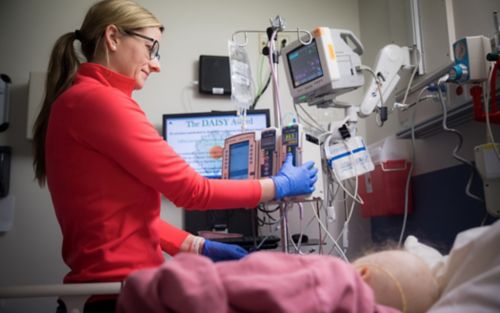What is DPYD?
When you take a medicine, your body needs a way to handle it. One way your body does this is by using enzymes to break down (metabolize) the medicine. Dihydropyrimidine dehydrogenase (DPYD) is an enzyme that can break down a class of medicines called fluoropyrimidines. Fluoropyrimidines include 5-fluorouracil (5-FU, Adrucil®) and capecitabine (Xeloda®).
Fluoropyrimidine medicines
Fluoropyrimidines are important chemotherapy medicines used to treat certain cancers. In children, fluoropyrimidines may be used to treat some liver tumors (hepatoblastoma), head and neck tumors (nasopharyngeal carcinoma), or brain tumors (ependymoma). In adults, they are sometimes used to treat breast cancer and cancers of the upper digestive tract (mouth, throat, esophagus) and lower digestive tract (colon, rectum).
Like many medicines, how well fluoropyrimidines work and their side effects can be different from person to person.
How pharmacogenomic testing works
Each person differs from another at the DNA level. Genes are segments of DNA that act as a set of instructions and tell the body how to work. The DPYD gene is a section of DNA that instructs how well DPYD enzymes will work.
The study of how genes like DPYD affect the way your body interacts with medicines is called pharmacogenomics. Differences in your DNA that make up the DPYD gene can change how well you are able to break down fluoropyrimidine medicines, such as 5-fluorouracil and capecitabine.
A pharmacogenomic test looks for differences that can help your medical team know how well your DPYD enzymes will work. The test results can help your doctor and pharmacist choose the correct type or dose of medicine to give you. Please share your pharmacogenomic test results with all your new doctors and pharmacists.
Most people have no problem breaking down fluoropyrimidines. However, about 2% (2 in 100) of people have a lower ability to break down these medicines. For these people, toxic levels of the medicine build up in the body. This can cause serious side effects such as:
- Infection
- Diarrhea
- Bleeding
- Painful sores on the hands, feet, or mouth
- Confusion
An even smaller number of people (1 in 1,000) have no DPYD enzyme function. If given normal doses of fluoropyrimidines, they may have severe side effects that can cause death.
After pharmacogenomic testing
The results of your DPYD pharmacogenomic test will place you into 1 of 3 DPYD gene groups:
- Normal metabolizer: People in this group have normal working DPYD enzymes. Doses of medicine do not need to be changed based on this DPYD pharmacogenomic test result. About 98% (98 in 100) of people are in this group.
- Intermediate metabolizer: People in this group have 30–70% lower DPYD enzyme function as compared to people with normal DPYD function. Your doctor may prescribe a lower dose of fluoropyrimidine or use a different medicine to avoid side effects. About 2% (2 in 100) of people are in this group.
- Poor metabolizer: People in this group have no normal DPYD enzyme. These patients are at very high risk of having severe, life-threatening side effects and should not take fluoropyrimidine medicines. About 1 in 1,000 people are in this group.
Scientists continue to find new information about which medicines are affected by genes. Talk to your doctor or pharmacist if you have questions about your medicines, side effects, or pharmacogenomic testing.
Find more information about genes that are being used to make medication therapy decisions for patients patients at St. Jude.
If you have questions about pharmacogenomic testing done at St. Jude, you can email the Clinical Pharmacogenomics Program at pharmacogenomics@stjude.org.



